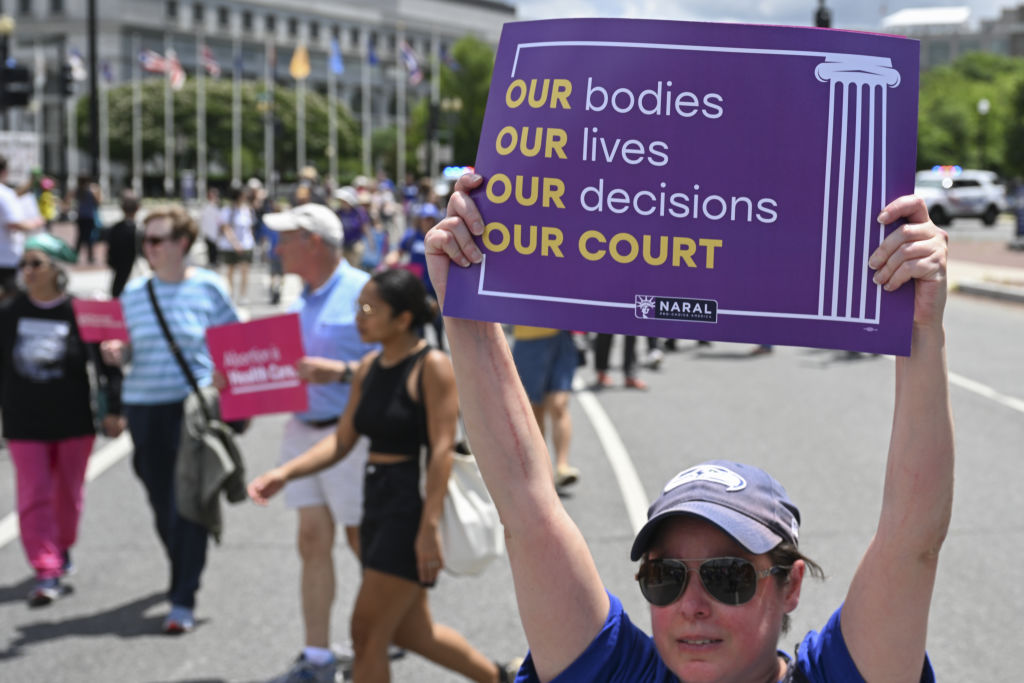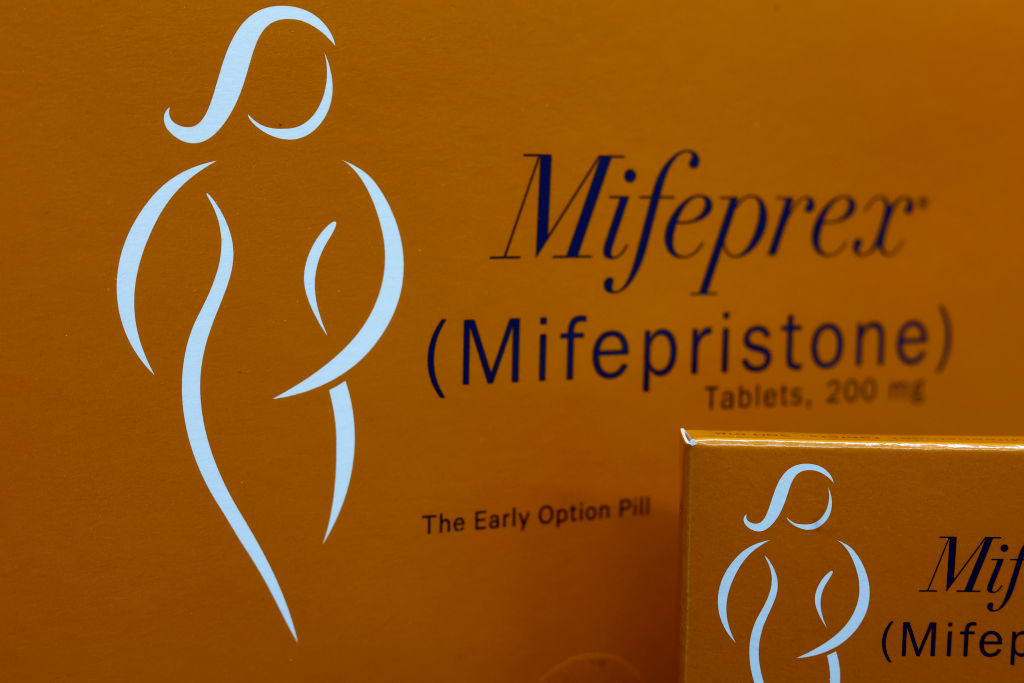A Supreme Court case led by a group of anti-abortion doctors and dentists against the FDA’s approval of mifepristone attempts to block access nationwide.

When the Supreme Court overturned Roe v. Wade in June 2022, the author of the opinion, Justice Samuel Alito, claimed that the Court was returning the authority to regulate abortion “to the people and their representatives.” In a concurring opinion, Justice Brett Kavanaugh wrote that the Constitution “leaves the issue for the people and their elected representatives to resolve through the democratic process.”
But this June, the Supreme Court could issue a decision that would severely restrict abortion access nationwide, even in states where abortion rights are protected. That case—Alliance for Hippocratic Medicine v. U.S. Food and Drug Administration—was filed against the FDA and the U.S. Department of Health and Human Services by the conservative legal group Alliance Defending Freedom on behalf of anti-abortion doctors and dentists.
Seeking to invalidate FDA approval of the abortion pill mifepristone, the plaintiffs chose to file the lawsuit in Amarillo, Texas, where there is a single federal judge, an extreme right-wing anti-abortion jurist named Matthew Kacsmaryk. Also notable, Kacsmaryk’s district is situated within the jurisdiction of the most conservative federal appeals court in the country, the Fifth Circuit. The plaintiffs claim they have the right to challenge the FDA’s approval of mifepristone because they might one day encounter a patient requesting treatment after using the medication.
“They are creatively crafting plaintiffs and claims in order to get before activist judges and get decisions they want,” said David Cohen, a law professor at Drexel University and an expert on the intersection of constitutional law and gender.
We have people with no medical training and no scientific knowledge trying to dictate the way medical care is provided.
Dr. Jamila Perritt, Physicians for Reproductive Health
The challengers allege that the FDA illegally accelerated approval of mifepristone in the 1990s and then subsequently loosened restrictions on the medication in 2016 and 2021 without adequate evidence of its safety. They also argue that the FDA’s 2021 decision to allow telemedicine abortion and mailing of abortion pills violates a 19th-century federal anti-obscenity law called the Comstock Act.
In fact, the FDA took years to review reams of research and clinical trials before approving mifepristone and then—because of anti-abortion pressure—placed the medication under severe restrictions. The agency blocked pharmacies from distributing mifepristone and allowed only physicians to prescribe the medication, which they had to secure from the pharmaceutical company licensed to manufacture the drug and dispense in person. Patients were required to have three appointments to obtain the medication. The original label recommended a dosage of 600 milligrams and use through only seven weeks of pregnancy.
In 2016, the FDA lowered the dosage to 200 milligrams, which reduces side effects such as nausea, and extended its approved use through 10 weeks. The agency also allowed any qualified healthcare provider, including nurses, midwives and physician’s assistants, to dispense the pills and reduced the number of required appointments to one.
In 2021, the FDA removed the in-person dispensing requirement entirely, allowing telemedicine.
This past April, Kacsmaryk issued a decision invalidating the FDA approval of mifepristone outright. The Department of Justice immediately appealed the ruling to the Supreme Court, which put Kacsmaryk’s ruling on hold until it could make a final ruling in the case.
The DOJ then appealed Kacsmaryk’s decision to the Fifth U.S. Circuit Court of Appeals. In August, a panel of three conservative Fifth Circuit judges—two of whom were appointed by former President Donald Trump—ruled that the challenge to the 2000 FDA approval of mifepristone was filed 16 years too late, but the challenges to the subsequent changes were timely. They then concluded that the FDA had inadequate scientific support to justify expanding access to mifepristone as it did in 2016 and 2021.
Reproductive health advocates condemned the decision.
“We have people with no medical training and no scientific knowledge trying to dictate the way medical care is provided,” said Dr. Jamila Perritt, president and CEO of Physicians for Reproductive Health. “What we’re seeing is a shift in favor of ideology instead of medicine that will have a devastating impact on folks in need of care.”
Both sides appealed the Fifth Circuit decision. The Supreme Court denied the anti-abortion doctors’ appeal but agreed to hear the DOJ appeal on two issues: whether the doctors of the Alliance for Hippocratic Medicine had standing to bring the lawsuit, and whether the FDA erred in making the 2016 and 2021 changes to the regulation of mifepristone. Legal experts believe it’s unlikely the Court will reopen the issue of the FDA’s 2000 approval of mifepristone—but it could.
“This case is not based on any kind of medical or scientific fact around abortion. It’s purely based on politics,” said Elisa Wells of the abortion pill advocacy group Plan C. “The fact that it’s been allowed to progress so far in the court system is outrageous.”
Hundreds of pharmaceutical executives have spoken out against the lower court rulings, stating that allowing this kind of challenge to the drug approval process could destabilize the drug market in the United States. Pharmaceutical companies and the trade association PhRMA have also filed briefs in the case, opposing the rulings.
The Supreme Court will hear oral arguments next week, on Tuesday, March 26, and issue a ruling by summer—just months before the fall election, when voters will decide on the next U.S. president and control of Congress.
On Legal Standing
It’s possible that the Supreme Court could dismiss the lawsuit for lack of standing: The anti-abortion medical providers who brought the case have in no way been harmed by FDA regulation of mifepristone, which is a requirement to challenge a government decision. The doctors and dentists base their standing on the speculative claim that they are injured because they may someday have to treat someone who has used FDA-approved mifepristone.
Legal experts believe the standing argument is really weak.
“There is a sense given some widespread criticism, even from very conservative circles, that the Court is going to decide they want to get rid of this case on standing. And they’re not going to get to the merits,” Cohen said.
Conservative legal commentator Adam Unikowsky agreed: “The plaintiffs’ theory is that unspecified doctors might prescribe mifepristone to unspecified pregnant women, who might experience medical complications and then wander into an emergency room, wherein they might randomly encounter one of the plaintiff-doctors, causing the plaintiff-doctors to expend resources or experience a conscience violation. A wall of Supreme Court case law establishes that this theory is far too speculative to establish standing.”
This story originally appeared in the Spring 2024 issue of Ms. magazine. Join the Ms. community today and you’ll get the Winter issue delivered straight to your mailbox.
Recognizing the tenuous nature of the plaintiffs’ standing, three anti-abortion state attorneys general from Idaho, Kansas and Missouri recently filed a motion to join the case as plaintiffs in an effort to allow it to continue if the Supreme Court rules that the original plaintiffs do not, in fact, have standing.
On Jan. 12, Kacsmaryk granted the motion, which Unikowsky describes as “an abuse of discretion several times over.”
On the Merits
If the Court does consider the merits of the case, there is voluminous scientific evidence supporting the FDA’s decisions to increase access to mifepristone in 2016 and 2021—though the Court may simply decide to disregard that evidence, as Trump-appointed judges did in both of the lower courts.
More than 100 studies have shown mifepristone is safe—safer, in fact, than Tylenol. In the 23 years since FDA approval of the medication, approximately 5.9 million women have used mifepristone with very few complications.
“I’ve been prescribing mifepristone for 23 years. It’s very safe. I have never even seen a patient hospitalized,” said Dr. Linda Prine, who works with telemedicine abortion provider Aid Access.

Across the world, many millions of women have used mifepristone in at least 96 countries that have approved the drug.
“Abortion pills are safe and effective, even for self-managed home use,” said Wells of Plan C. “There’s no reason they should be restricted in any way. In fact, in many countries around the world, they are available directly off of pharmacy shelves. You don’t need a prescription.”
Though the FDA loosened some of the restrictions on mifepristone, it has maintained others, such as requiring healthcare providers and pharmacies to be certified with the drug company before dispensing the medication, which limits the number of providers, and requiring patients to sign an informed consent form. According to the American College of Obstetricians and Gynecologists, these restrictions are medically unnecessary and burdensome to people seeking the medication.
Attorneys general of 17 states have filed a separate lawsuit asking a federal court in Washington state to direct the FDA to remove these remaining barriers to obtaining mifepristone. Meanwhile, the Supreme Court case threatens to cement and expand them.
As Drexel University’s Cohen explains, if the Supreme Court rules that the FDA did not follow the appropriate procedures in modifying its regulation of mifepristone, the agency could encourage drugmakers Danco Laboratories and GenBioPro to submit a new application to update the restrictions. He adds that the FDA could also issue an enforcement discretion notice letting the drug companies know that the agency will not stringently enforce the restrictions.
No matter what the Supreme Court decides, the results of the November election will determine who runs the FDA and what happens to mifepristone in the future.
“[Due to] the way FDA authority is structured, the secretary of HHS has a lot of authority to override scientists at the FDA,” said University of California, Davis, law professor Mary Ziegler.
In other words, a Trump administration could rescind the FDA’s 2016 and 2021 decisions to expand access, or try to withdraw mifepristone from the market altogether.
Telemedicine Abortion
The potentially more damaging possibility is that the Court could rule that the FDA’s 2021 decision allowing telemedicine abortion and mailing of mifepristone violates the 19th-century anti-obscenity Comstock Act, which made it a crime to mail anything the Victorian era considered to be obscene, including contraceptives, abortifacients and any information about contraception and abortion.
“The modern anti-abortion movement wants to reinvent the Comstock Act as an abortion ban,” Ziegler said, while Cohen warns that if the Court revives the Comstock Act and interprets it to ban the mailing of mifepristone, that could also prohibit the mailing of anything else used for abortion, including cervical dilators, curettes and vacuum aspirators, and shut down clinics.
“The Comstock part of the case is really scary,” he said. “It could really have a devastating effect on abortion access nationwide.”
Although Cohen said that reviving Comstock may not have an immediate effect during the Biden administration because the FDA has discretion to allow continued use of mifepristone in accordance with current science, he notes that the situation could change if Trump wins the 2024 election. Not to mention, the Supreme Court is currently considering two cases seeking to limit the authority of executive branch agencies like the FDA and give courts much more power to strike down agency decisions, including those enforcing women’s access to healthcare.
The modern anti-abortion movement wants to reinvent the Comstock Act as an abortion ban.
Mary Ziegler, University of California, Davis
The Impact
If the Supreme Court upholds the Fifth Circuit decision, abortion seekers will face more crowding at clinics, increased wait times and rising costs.
“Limiting access to mifepristone will have devastating effects for people who are seeking abortion care,” said Perritt of Physicians for Reproductive Health, noting that restrictions would disproportionally impact those already experiencing barriers to abortion care, including the poor and the young, along with undocumented, rural and BIPOC communities.
“Telemedicine has certainly made it easier to get abortions for many people,” Wells of Plan C agrees. “It’s not perfect. You have to have a phone or computer and access to broadband. But we do know that it is reaching into very rural areas and it’s reaching people who might not have access to transportation or who might not be able to travel to another state because they have work or childcare responsibilities that prevent them from traveling.”
Without telehealth services, abortion seekers will be forced to go in person to clinics and doctors’ offices to receive mifepristone, exposing them not only to delays and increased costs but also to harassment, threats and other types of violence from anti-abortion extremism, which has increased dramatically since the fall of Roe.
Women in every state would be affected. “All of the red states are now relying on telemedicine abortion to get pills,” Prine said. “But there are [also] a lot of little primary care practices that have integrated medication abortion, including telemedicine abortion, into the care that they give in the blue states.”
Some healthcare providers may be willing to continue to prescribe mifepristone despite the decision.
“If suddenly we revert back in time to a prior FDA approval status, meaning that people believe that they could not mail mifepristone, I think we would find many medical providers practicing civil disobedience and mailing the pills anyway because they know that it’s safe and effective and in the best interest of their patients,” Wells said.
Asked whether she would still prescribe by telemedicine if SCOTUS were to reinstate the 2000 regimen, Prine equivocated: “It depends on the fine print and what the ruling actually says. But if there’s any way at all that we can read into it any wiggle room, we’ll just keep providing.”
Advocates also say a Supreme Court ruling restricting access to mifepristone through the medical system would be unlikely to diminish access to abortion pills through alternative routes. In fact, just the opposite would occur.
“We know that there would be many of these alternate routes of access still available through online services that mail abortion pills into the United States, and also through the community support networks that are providing free abortion services in all of the restricted states,” Wells said. (All of these services are listed on the website of Plan C.)
“Telemedicine has been hugely important for increasing routes of access to abortion in the United States,” she adds. “People are so grateful to have the convenience, the confidentiality and the control that telehealth gives them to have a safe abortion in their homes. We think that there’s no going back now. We’ve seen what’s possible.”
The 2024 Election
The Supreme Court is hearing two abortion cases this term. In addition to the mifepristone case, the Court will rule whether a federal law requiring federally funded hospitals to provide emergency medical care, including abortion, preempts a state law banning abortion in medical emergencies (see P. 10). Idaho’s case will likely be decided in June or July, shortly before the presidential election— creating the potential for negative political impacts for Republicans, who are widely perceived to support abortion restrictions.
Popular support for abortion pills is high. According to the Pew Research Center, a majority of Americans believe medication abortion should be legal in their state, and fewer than a quarter believe it should be illegal.
“It could backfire for the [anti-abortion] movement to bring a case like this that’s just so egregious and so cruel to people who need access to modern medical care,” Wells said. “What it does is it draws attention to the terrible access we have in the United States and the fact that we have a safe, effective medication that’s being withheld from us. That is driving voters to the polls to vote.”
Ziegler believes the timing of the cases might even influence the Court’s decisions. “They may find a way to cede the questions they don’t think will go over well with voters to a period when voters are not voting anytime soon,” she said.
Still, she adds, “whatever happens … this year, it will not be the end of the matter.”
The Supreme Court’s majority will no doubt continue to look for ways to restrict abortion access, and women will continue to share abortion pills and information—no matter what happens.
Up next:
U.S. democracy is at a dangerous inflection point—from the demise of abortion rights, to a lack of pay equity and parental leave, to skyrocketing maternal mortality, and attacks on trans health. Left unchecked, these crises will lead to wider gaps in political participation and representation. For 50 years, Ms. has been forging feminist journalism—reporting, rebelling and truth-telling from the front-lines, championing the Equal Rights Amendment, and centering the stories of those most impacted. With all that’s at stake for equality, we are redoubling our commitment for the next 50 years. In turn, we need your help, Support Ms. today with a donation—any amount that is meaningful to you. For as little as $5 each month, you’ll receive the print magazine along with our e-newsletters, action alerts, and invitations to Ms. Studios events and podcasts. We are grateful for your loyalty and ferocity.





